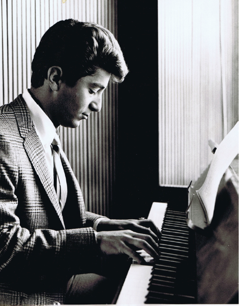Hello Ronnie, how are ya? Ronnie, I want you to say hello to my son, here, this is Jeff
– Jeff, this is Ronnie Duncan.
Until recently, one of the more puzzling artefacts in the Ronald Duncan Collection was a recording of a set of musical theatre songs identified as ‘Music for Ezra Pound’s plays’. This identification did not ring true – the greeting and introduction recorded on the tape were very clearly addressed and it seemed almost as unlikely that Duncan should be involved in discussions about music for Ezra Pound’s plays as it did that Ezra Pound would be known as ‘Ronnie’. However, aside from the songs, the only significant pieces of evidence offered by the recording as to its origin were that one of its participants was named ‘Jeff’ and that he was the son of the other speaker. Here, then, was our first question: What was this recording? Without knowing all of Duncan’s work intimately, and with seemingly little else to go on, the recording joined a number of cryptic items that we hoped to understand better as the project unfolded.
The question was answered when Caroline Walter (project archivist) found a reference to a musical production of Duncan’s novel St Spiv in a letter from Jerry Wayne. With this information and some very helpful correspondence with Jeff Wayne’s assistant, Lindsey Key, Caroline was able to confirm that the recording is a demonstration tape of a musical theatre adaptation of St Spiv by none other than Jerry Wayne and his son Jeff Wayne, the creator of Jeff Wayne’s Musical Version of The War of the Worlds.
Ronald Duncan, proudly highbrow, seems an unlikely partner in the creation of a musical, but the collaboration came about through Eric Glass, agent to Ronald Duncan and London agent to Jerry Wayne. Glass, a recurrent figure in the collection, was himself a well-known character within literary and theatrical circles who had also worked briefly with MI5 during the Second World War in an operation to divert funding for Nazi spies in Britain away from its intended recipients. When informed that Jerry Wayne was interested in producing musicals for the London stage, Glass suggested a number of stories that might be suitable for adaptation, one of which was Duncan’s St Spiv. Arrangements were made, the script, lyrics, and music were written, and, after arriving in the UK to set things up, Jerry and Jeff went to stay with Duncan for a few days at Mead Farm, Welcombe, to work on the musical.

Jeff Wayne playing the piano at Mead Farm, c. 1966.
A farcical tale of a Cockney spiv who finds himself possessed of miraculous healing powers, St Spiv had existed in a number of formats before it came to the attention of Jerry Wayne in 1964 – as a short story (The Cockney Circus), as a play and, latterly, as a novel (first published in 1961). By mid-1965, its latest incarnation was being foreshadowed by the press and, on the 10th of June 1965, The Stage reported that Jerry Wayne was to present it in London in the September of that year, noting that the musical was based on Duncan’s novel and that ‘Mr. Wayne [had] adapted the book and [written] the lyrics to music composed by his 21-year-old son, Jeff Wayne.’ In May, a similar article from the Evening News, London, had reported that St Spiv would be presented in ‘the fall’, as well as a production of Two Cities (based on Charles Dickens’ A Tale of Two Cities), also adapted by Jerry and Jeff Wayne. Of these two musicals, only Two Cities was to appear before the public proper. Although it received a club performance and professional demonstration recording, St Spiv was never to make it to the open theatre. But why? This was our second question.
In a letter dating from the 10th of March (probably of 1966), Jerry Wayne asked Duncan to send him the reviews of St Spiv ‘… when it played at the new Arts Theatre’, and, in the same letter, he dealt with a number of script editions needed before setting a date for the show to appear. The tone of the letter was a positive one, and Wayne ended it by writing ‘I therefore feel it is absolutely imperative that no further time is lost in accomplishing this rewrite.’ Artistic differences, then, seem not to have been the cause of the show’s demise; likewise, and based on the lively and catchy numbers preserved by the informal demo-tape, it seems unlikely that quality was the problem. Instead, and as in many cases of musico-literary collaborations, it seems that a rift opened between the collaborators on the matters of rights and royalties. In a letter to Duncan dated the 6th of May 1966, Eric Glass suggested that negotiations had reached an impasse – the 30% required by Duncan was too distant from the 15% offered by the co-producer, Stanley Gordon. Taking the view that he could negotiate no further, he wrote
… I think in the circumstances all we can do is try and sell the film rights or find a musical author or lyric writer who may be prepared to start from scratch on your original novel.
It is very sad that after all this time the deal has come to nought…
As a coda to this post, here is the end of the last song from the show, which is both accidentally apt and rather enjoyable.
Written by Andrew Cusworth. We are very grateful for the assistance of Jeff Wayne and his assistant, Lindsey Key, and for Jeff Wayne’s permission to share parts of the demonstration tape and the photograph of Jeff Wayne at Mead Farm.